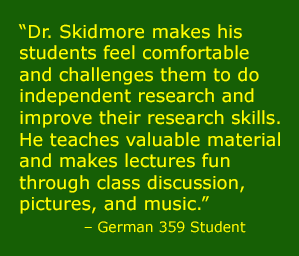James Skidmore: Seeking the Greater Good
 |
|
James Skidmore, Department of Germanic and Slavic Studies |
Written by Arifeen Chowdhury, Special Projects (Teaching Stories), CTE.
Dr. James Skidmore does not consider himself a teacher. To do so, he says, would place too much emphasis on being the “leader” of the classroom. Instead, Skidmore wants to think of himself as an educator: someone who fosters learning not because he wants students to learn the course content but because he wants students to develop a better understanding of the world around them, and their role within it. To this end, Skidmore strives in both his online and face-to-face courses to be provoking – thought-provoking, that is – in order to foster a learning culture of ongoing exploration. That’s the paradise on earth he dreams of.
Mainstream culture often places the onus on the professor to make sure students learn. Skidmore believes it is up to the students themselves. He ensures that his students understand the importance of being responsible for their own education and that learning is a collaborative process. Accordingly, Skidmore works hard to get his students to be fully present – physically, intellectually, and emotionally – so that they engage and participate with their whole being.

Skidmore extends these aims and values beyond the traditional classroom: distance education is one of his fortes. His online courses include content and learning activities that he has designed as well as discussion-based modules that promote active learning through a participatory experience. His success in this endeavour was recognized when he received the 2012 German Online Award for the development of online teaching materials.
Another project that Skidmore is getting off the ground could have even greater ramifications for the future of teaching. Together with Christina Kraenzle from York University, he is co-editing a new website, kultur360.com. He says, “Originally we just wanted to create a resource site for instructors who teach courses about German society and culture, but oriented to the here and now.” Skidmore and Kraenzle soon realized, however, that they didn’t want to create a static e-textbook. Accordingly, they instead developed a dynamic site where academics contribute original and authentic commentaries, reviews, and interviews that provide analysis of German society and culture that can be used by instructors anywhere. Development of kultur360 was supported by eCampus Ontario and the University of Waterloo LITE grants program.
Skidmore is one of two Teaching Fellows in the Faculty of Arts. For him, the key role of the Teaching Fellow is to foster a culture of discussion, one with a holistic approach to education, so that instructors can solve instructional challenges as a community. Recently, such discussions have helped inform a Waterloo initiative to enhance the infrastructure of classrooms: better lighting, acoustics, seating, and so on.
But the role of a Teaching Fellow, he adds, also extends to encouraging a civic-minded ethos so that instructors see themselves as having a duty to seek the greater good of educating society at large. “Knowledge,” he says, “is meaningless unless we share it, and one of the best ways of sharing it is through education. Keeping knowledge to yourself makes that knowledge worthless.”
Read more Teaching Stories
More Resources
CTE has developed more than 100 Teaching Tips. Each one is a succinct document that conveys useful ideas and practical methods for effective teaching. Some of the Teaching Tips that are relevant to the strategies mentioned in this Teaching Story include the following: